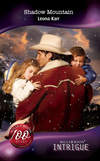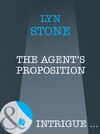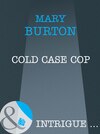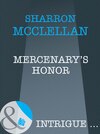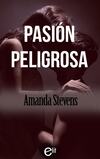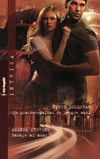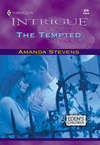Kitabı oku: «Secret Sanctuary», sayfa 3
He glanced at her warily. “Claustrophobic?”
“An abnormal dread of being in closed or narrow spaces.”
“I know what it means,” Cullen said dryly. “But only you would put it that way.”
“What way?”
“Only you would use the exact dictionary definition. Word for word, I’ll bet.”
She lifted her chin. “What’s wrong with being precise?”
“Nothing.” She wouldn’t understand even if he explained it to her. People with a high IQ seemed to live in their own little world. “I don’t have claustrophobia,” he said with an impatient shrug. “I just don’t care for all these damn plants.”
“Well, maybe you have botanophobia. Fear of plants.”
“What I don’t have is time,” he snapped. “Let’s get on with this.”
“Of course.” She gave him a cool glance as she turned and walked to the back of the solarium without another word.
Cullen hoped he hadn’t hurt her feelings, but, damn, she could be so annoying. There seemed to be no end to the trivia she’d stuffed inside that head of hers. She’d always been way too smart—and far too superior—for her own good in Cullen’s opinion. That was one of the reasons she’d had so much trouble in school. Bad enough she was such an Einstein, but did she have to rub people’s noses in it?
It was a shame, too, because she wasn’t a bad-looking girl. Cullen supposed that some might even consider her attractive, in a sisterly sort of way. Nice hair. Nice eyes. Slight build.
She’d matured since he’d left town six years ago, but she was still very young. He had a hard time thinking of her as anything other than the bratty little kid he’d tried to protect from the bullies who’d ragged on her in school. Although, to this day, he couldn’t figure out why he’d bothered. She’d made it clear from the first she didn’t want or need help from the likes of him.
Fair enough, he supposed. She wasn’t only brilliant, she was rich to boot. She came from the ritzy part of town, and Cullen had grown up down by the docks. Her parents were scientists; his old man had been a drunk. They didn’t exactly travel in the same social circles, he and Elizabeth.
She’d stopped in front of him again, her head tilted skyward. Cullen glanced up. The body dangled about ten feet from the floor from a steel girder that helped support the glass dome.
Cullen’s blood went cold with shock even though he’d had plenty of time to prepare himself. It didn’t matter how prepped he was or how many times he worked a crime scene, murder always got him in the gut.
Especially when the victim was very young.
She couldn’t have been more than eighteen or nineteen. Someone’s daughter. Someone’s sister. Snuffed out by a cold-blooded murderer who’d left her hanging there like a piece of meat in a butcher-shop freezer.
“It’s not a suicide,” Elizabeth murmured.
No, it wasn’t a suicide, he thought grimly.
“I can’t see any wounds,” she added, “But I’m certain she was dead before she was hanged. Otherwise, there would be…visible signs.”
A protruding tongue, for one thing. “How the hell did he get her up there?” Cullen muttered.
Out of the corner of his eye, he saw Elizabeth shiver. She’d been the girl’s professor at Heathrow, but he was willing to bet there wasn’t more than a year or two difference in their ages. In spite of himself, he felt his protective instinct stirring again. She shouldn’t be here. He shouldn’t have let her come back in here.
“This won’t take long,” he said. “I just need to ask you a few questions about finding the body. I want you to show me where everyone was standing when the Pierces came in here. Tell me about their reactions, what was said, anything like that you can remember. Then you can wait outside with everyone else.”
She turned to stare up at him, her expression earnest. “I’d really like to stay until Dr. Vogel examines the body.”
Cullen shook his head. “That’s out of the question.”
“Why?”
“Do I have to state the obvious? You found the body.”
“But what does—” She stopped abruptly, her eyes going wide. “Are you saying I’m a suspect?”
He shrugged. “Everyone here is a suspect. I’m not ruling anyone out at this point.”
“But—” She broke off again. “Of course. I understand. You have to take that approach. But I really think I can help you. I know about crime-scene investigation. I’m a professional, just like you.”
“Not exactly like me. You aren’t wearing a badge,” he said bluntly. “If you really want to help, just answer my questions. That’s all I need from you.”
She looked as if she wanted to protest, but decided against it. Pursing her lips, she turned her back on him.
He’d probably hurt her feelings again, but it couldn’t be helped. Ph.D. or not, Cullen wasn’t about to involve a civilian in his investigation. For one thing, bringing in an outside consultant was a tricky business. Egos could get in the way, and secondly, he had his reservations about Elizabeth’s competence.
Oh, she was plenty intelligent. No question about that. But it had been Cullen’s experience that no amount of classroom theory or book knowledge in the world could take the place of plain old-fashioned street smarts, the kind learned the hard way. And for all her education and degrees, Cullen doubted she’d ever really been put to the test. After she answered his questions, he’d send her packing.
“There’s a ladder against one of the walls,” she said.
He frowned. “What?”
“You asked how he’d gotten her up there. I saw a ladder in here earlier. Mr. Pierce said it’s used to cut away dead leaves from the vines and the larger plants, and to change the bulbs when the ultraviolet lights burn out.”
“Did anyone touch it that you saw?”
“No. Mr. Pierce suggested his sons use it to cut her down, but I discouraged that. I warned them we had to leave her as we’d found her.”
At least she’d done that right, he thought grudgingly. “We’ll dust the ladder for prints,” he said, ignoring the expectant look on Elizabeth’s face.
He studied the immediate area underneath the body. The floor was a mess with broken pottery scattered about and muddy water all over the flagstones near the French doors. Cullen could see at least one partial footprint in the sludge.
He motioned to the floor. “Was all this here when you came in?”
Elizabeth bit her lip. “The floor was wet, but I knocked over the pots when I fell.”
He’d been afraid of that. “Is that your footprint?”
“Yes, I think so.”
“We’ll have to check it out anyway. We may need your shoes for verification.”
“Of course.”
They both fell silent for a moment, then Elizabeth said softly, “You noticed, didn’t you?”
“Noticed what?”
“There’s no blood on the body or on the floor. And look at the color of her skin. She looks as if she’s been exposed to extreme temperature, but there’s no frostbite.”
Cullen had seen the same thing, but he’d kept his observation to himself. He’d learned a long time ago to make no assumptions.
“My guess is she was killed somewhere else and brought here,” Elizabeth said. “She could have been dead for several days. The killer probably kept her in a cooler or freezer somewhere until the time was right.”
“Meaning?” Cullen glanced at her curiously. Whether he wanted to admit it or not, something about the confident manner in which she spoke had his attention.
“Until he was ready for someone to find her.” Elizabeth’s gaze moved upward, where the body of Bethany Peters stirred gently in a slight draft from a heating vent. “He put her on display. She was left here, like this, for a reason. The killer is trying to tell us something.”
Cullen knew instantly what she meant. One-time crime-of-passion killers would only take the time to move the body of their victim in order to dump it in a remote location or to try and throw off the police. They wouldn’t flaunt it. Neither would a professional hit man. There was only one type of killer who would.
Elizabeth turned to Cullen, her eyes deeply troubled. “This is a very bad thing, Cullen.”
His gaze lifted to the body. It didn’t take a genius to figure that out.
THE MOMENT the medical examiner arrived, Elizabeth was expelled from the solarium.
“We’ll take it from here,” Cullen told her firmly.
“But I’d like to help—”
“If we need your help, we’ll ask for it.” He must have realized how harsh his words sounded because he almost at once altered his tone. “I appreciate everything you’ve done so far, but this is a police investigation. You need to wait outside with everyone else.”
When she still resisted, his grasp tightened on her elbow. “Come on, Elizabeth. Cut me a break here.”
“But you can’t seriously consider me a suspect,” she protested. “If you’d listen to your brain for a moment instead of your ego, you’d realize I could help you.” She winced. That hadn’t come out at all right. She hadn’t meant to goad him, but somehow, around Cullen, she always managed to say the wrong thing.
“You’ve done quite enough already,” he said coolly.
“If you’re referring to letting the Pierces come into the solarium, I had no authority to keep them out,” she defended. “I’m not a police officer.”
He arched a brow. “Precisely my point.”
“Just let me stay while Dr. Vogel examines the body. I want to hear what he says about cause of death.”
“Out.”
“Cullen—”
“Out.”
He opened the solarium door and gave her an unceremonious little push into the hallway. The door closed firmly behind her.
The Pierces were still in the hallway, and they gazed at her curiously.
“I take it your services are no longer required,” Drew commented.
“Cops can be so…infuriating.” The latex gloves snapped loudly as Elizabeth peeled them off.
“They do tend to have a one-track mind,” William sympathized. “But in this case, I have to agree with Detective Ryan. A murder scene is no place for a young lady.”
“But I teach criminology,” she protested. “I’m not unfamiliar with crime scenes.”
“You can’t be more than a day over twenty years old. Hardly more than a child. If Natasha were still alive, I certainly wouldn’t want her subjected to such a gruesome scene.” Pain flashed in William’s blue eyes, and whatever annoyance Elizabeth had been harboring toward him for his comments about her age vanished. Tasha’s death had affected them all, but especially her family. It was obvious that her father still grieved her passing. That was why he hadn’t been able to forgive David Bryson and probably never would.
But had Bryson been able to forgive himself? Elizabeth wondered. Or had his guilt driven him to do unspeakable evil, as some of the townspeople suspected?
Careful, she warned herself. Don’t let your imagination get the better of you.
They had absolutely no evidence thus far linking David Bryson to Bethany’s murder. Nothing except an innate distrust of the man, and Elizabeth knew she was prejudiced in that regard. Tasha had been her friend.
If she wasn’t careful, such a biased perspective would end up proving Cullen’s point—that she had no place in a murder investigation.
“They won’t find anything,” Geoffrey Pierce murmured in a strange, offhand manner, his gaze on the solarium door. “That girl was dead before she was hanged.”
Elizabeth had come to the same conclusion, but it wasn’t exactly admiration she felt for Geoffrey’s keen perception.
Earlier, when they’d all rushed into the solarium, the other Pierces had been deeply disturbed by the sight of the body, especially Zachary, who’d turned a bit green when his father suggested that he and Drew find a way to cut her down. The same look of horror and compassion had emanated from all the Pierces’ blue eyes—all except for Geoffrey’s.
In his eyes only a cool curiosity had gleamed.
Elizabeth had to wonder about a man, a nonprofessional, who could remain so stoic and unaffected in the face of such horror.
Her gaze on him narrowed. “Why do you think Cullen won’t find any evidence?”
He shrugged. “Because whoever did that knew what he was doing.”
“He?”
“Given your field of expertise, I’m sure you know as well as I do that crimes of this nature are almost always masterminded by white males. Serial killers seem to be a unique affliction to our race and gender.” He didn’t seem especially disturbed by his conclusion.
“Serial killer?” Elizabeth said, feigning surprise. “Who said anything about a serial killer?”
Geoffrey gave her an enigmatic smile. “Don’t tell me the same thought didn’t cross your mind when you saw her hanging there. The way the body was put on exhibition? What else could it be?”
“An act of rage,” Elizabeth said. “A crime of passion.”
He shook his head. “You don’t believe that. You know what we’re dealing with here as well as I do.”
Elizabeth had studied crimes such as this in both her undergraduate and graduate courses. She’d learned a long time ago what it meant when a murderer “signed” his kill.
But she couldn’t help wondering how Geoffrey Pierce knew.
And would another body soon follow that would prove his point?
Chapter Four
The storm had moved out to sea an hour or so earlier, but Elizabeth could still see flashes of lightning in the distance as she sat in her parked car down the street from Krauter’s Funeral Home. The downpour had finally abated into an icy drizzle that glistened on the cobblestone pavement like a scene from a French Impressionist painting.
The hour was very late, after three in the morning, and for a moment, Elizabeth was struck by the eerie silence, the preternatural peace that had settled over the night in the wake of bone-chilling violence.
Cloistered in the leathery confines of her new car, she could almost believe that the last few hours had never happened. But they had. A young woman was dead. A student had been murdered, and Elizabeth had discovered the body. No seminar or classroom or degree in the world could have prepared her for that grisly sight.
She watched nervously as the gleaming black hearse carrying Bethany Peters’s body slowly glided past her. The windows were so darkly tinted in the vehicle that she couldn’t make out any of the occupants, but she knew that besides the driver there was one other attendant. She’d been present at the Pierce mansion when the mortuary people had arrived to pick up the corpse.
Tomorrow, Bethany would be transported to a nearby hospital where an autopsy would be performed, and the cause of death would likely be determined. But for tonight she would remain in a cooler at Krauter’s.
A squad car—flashers blacked out, siren silenced—followed the hearse, and Elizabeth ducked down in her seat even though she was fairly certain Cullen had remained at the mansion. He had hours of interviews to conduct and acres of grounds to search, but he would abandon everything in a heartbeat if he had even an inkling of what Elizabeth was up to.
She tamped down a momentary reservation. Okay, so what she had in mind wasn’t exactly brilliant. Probably wasn’t even a good idea. She would be interfering with an official police investigation. She could be fined, even do some serious jail time if she were caught, but Elizabeth didn’t see that she had any other choice. When she’d approached Cullen again later about examining the body, he’d told her no way. No way in hell, to be exact.
“Just give me one minute, Cullen. That’s all I’m asking for. I need to see the body again. I think I saw something—”
“Saw what?”
“I’m…not sure.”
He ran his fingers through his dark hair, a gesture that was both familiar and endearing—or would have been, if Elizabeth hadn’t been so thoroughly irritated with him.
The feeling, evidently, was mutual. “I don’t have time for this, Elizabeth.”
“Why do you have to be so stubborn? Can’t you just admit you may need my help?”
“With what?”
“The investigation, for crying out loud.”
He gazed down at her for a long, tense moment, his gray eyes cool, remote. Sexy. “Haven’t you ever heard that old saying, Elizabeth? Those who can, do; those who can’t, teach.”
That hurt.
She gave him a disparaging look. “Are you afraid to let me see the body, Cullen?”
“Why would I be afraid?”
“Maybe you think I’ll find something you didn’t.”
His expression became rigid then, and Elizabeth had known she’d gone too far. Again. She’d pressed him way past irritation all the way to anger. Maybe even nudged him into contempt.
“Just stay out of my way, okay? And don’t let me catch you playing Nancy Drew with this case. I’m warning you, Elizabeth…”
Nancy Drew! The nerve, Elizabeth fumed, as she huddled more deeply into her leather seat. Did Nancy Drew have a Ph.D. in criminology? Had Nancy Drew struck up an e-mail correspondence with one of the most famous profilers in the Behavioral Science Unit at Quantico? Did Nancy Drew have an IQ of—
Okay, okay, a little voice complained inside her. Enough already. You’re starting to annoy me, for God’s sake.
It was true she never knew when to give up, but Elizabeth had always considered persistence a virtue, not a vice. And she was certain she could help solve this case if Cullen would just give her a chance.
But he was hung up on her age, just like everyone else. If she were a man, if it had taken her the usual amount of time to complete her graduate degree and subsequent field training, no one would question her expertise. No one would think twice about using her on this case.
But she was only twenty, looked even younger, and because of that, Cullen was shutting her out.
Be honest, that same little voice taunted her. Are you really upset because he won’t use you in the investigation, or because he still sees you as an immature schoolgirl? Someone he could never be interested in romantically or…sexually.
Elizabeth sighed. She might as well be a brain without a body for all the male attention she elicited. Unless you counted Dr. Paul Fortier, a biology professor at Heathrow, and since his reputation with the opposite sex was a bit notorious, Elizabeth didn’t think she could consider him a conquest.
Besides, she wasn’t absolutely certain he’d made a pass at her. She’d had a high fever when he’d approached her a few weeks ago after a faculty meeting. It was entirely possible she’d misinterpreted his gesture—and what he’d said to her—but whatever the case, there was something about the man that creeped her out big-time. The way his eyes had seemed to slide all over her when he’d looked at her. The way her skin had crawled when he’d touched her.
Shivering, she rose in her seat and glanced out the window. Tires swished against the wet pavement as the hearse and the police car turned into the drive of the narrow, three-story structure which housed not only the mortuary and crematorium, but the private residence of Ned Krauter, the town mortician.
Out of respect for the dead, or perhaps the late hour, car doors closed quietly as the attendants got out of the hearse and the officer climbed out of the squad car. The three men stood talking for a moment, and Elizabeth let her gaze scan the funeral home.
Windows were lit on the second story of the building where Mr. Krauter resided, and on the ground floor where the mortuary facilities were located.
The third story had been converted into an apartment for lease, and in spite of all the activity below, the windows up there remained dark. Exactly what kind of person would want to live over a funeral home and crematorium, Elizabeth couldn’t imagine, but her concern tonight wasn’t for Mr. Krauter’s lodger, but with Mr. Krauter himself, and how she might be able to sneak into the building without him knowing.
It was a risky proposition, but Elizabeth desperately wanted a closer look at Bethany’s body. Once the postmortem took place, it might be too late. Whatever it was that had disturbed her earlier might be lost forever.
After another moment of quiet conversation, the attendants opened the back doors of the hearse and slid out the gurney. A sheet covering the body fluttered in the wind as the attendants wheeled the gurney to the back door of the mortuary. Once they and the police officer had disappeared inside, Elizabeth got out of her car and ran along the street toward the funeral home, clutching her cloak tightly against her. Now that the storm had passed, the temperature was plummeting, and she could feel the chill seeping into her bones.
As she’d expected, the back entrance had been left temporarily unlocked. Elizabeth opened the door a crack and peered inside. No one was about, so she slipped in.
She’d never been in that portion of the funeral home, but the layout of the house was not unlike that of dozens of other clapboard homes in Moriah’s Landing.
In fact, the entire structure had once been a private residence. Ned Krauter’s grandfather had immigrated from Europe right after the First World War, bringing with him the family mortuary trade which had been passed down for generations. Why he’d left Europe no one seemed to know, but soon after his arrival in Moriah’s Landing, he’d bought the large house for a song from a widow who’d found herself in a desperate financial situation after her third husband had unexpectedly committed suicide.
Krauter had turned the residence into a funeral home, and when he’d died back in the fifties, he’d left his only son a flourishing business which Krauter the Second had, in turn, passed on to his only son, along with an assortment of odd family traits that had been for years the source of no small amount of speculation in Moriah’s Landing.
The current Mr. Krauter had never married and thus had no heir. Elizabeth couldn’t decide whether she considered his childless state a pity or a blessing.
The room she stood in had once been the kitchen of the original residence. The sinks and cupboards had been upgraded to stainless steel, but most everything else had been stripped away. It was now used as a receiving room—the entry point for bodies to the funeral home. There were signs posted in prominent areas which proclaimed that the room met all state and federal requirements for blood-borne pathogens. Although it wasn’t a formaldehyde area, Elizabeth could smell a strong disinfectant that made her slightly queasy.
Several doors radiated from the receiving room, most of them clearly marked. The embalming room, straight ahead. To the right, near where she stood, the crematory. To her left, the coolers. To her far right, an unmarked door that led presumably into the other areas of the funeral home.
It would take only a few moments for the attendants and the officer to transfer the body to one of the coolers, and then they’d come back in here. The officer would probably remain on guard all night, in his squad car she hoped. If he stayed near the coolers or in the receiving area, Elizabeth would have a big problem. But she didn’t think that too likely. People in Moriah’s Landing were nothing if not superstitious, and that included most of the police force.
All she needed to do was find a place to hide until the coast was clear. She surveyed her options once again. The embalming room. The crematory. The unmarked door.
Duh, as her students would say.
Elizabeth opened door number three and cautiously stepped through.
A narrow, dark hallway stretched before her, and she hesitated just inside the door, trying to get her bearings. But it was no use. The corridor was windowless, making navigation highly precarious. Elizabeth hated to use her flashlight, but unless she wanted to stumble around and risk detection, she had no other choice. Pressing the switch, she angled the beam down the hallway.
If she could locate the lobby or the chapel, that wouldn’t be so bad. She could find a pew and sit quietly. Meditate on how much trouble she would be in if Cullen were to find her there.
Maybe he would even threaten her with…dire repercussions. For a moment Elizabeth let herself fantasize about the possibilities.
Then she snapped out of it. Kinky wishful thinking, coming from a girl—a woman—who’d barely even been kissed.
She suppressed a sigh just as a light came on at the end of the hallway and she heard footsteps. Someone was coming down the stairs.
Elizabeth’s heart started to pump in overdrive. There was a door just ahead, and she rushed toward it, the skirts of her costume rustling noisily. She doused her flashlight and melted inside the room just as the footsteps sounded down the hallway.
They came closer. Closer. And then they slowed.
Elizabeth held her breath. She glanced around frantically for a place to hide, but she could see nothing in the darkened room, and she didn’t dare turn her flashlight back on.
The door opened, and she pressed herself against the wall behind it, praying that the abundant folds of her dress would not spill out and reveal her hiding place.
For a moment, her luck seemed to hold. Nothing happened. Nothing moved. Elizabeth didn’t even dare breathe. She stood there, pulse hammering in her throat as she tried to will away whoever stood on the other side of the door.
And then the light came on, and she blinked, certain that she’d been caught. When her eyes became accustomed to the blinding glare, she glanced around.
Whoever stood in the doorway did not come into the room, but Elizabeth wasn’t alone.
Not five feet from where she stood squeezed against the wall, a woman she didn’t recognize rested peacefully in a satin-lined coffin.
“Good night, Mrs. Presco,” a voice whispered from the doorway.
THIRTY MINUTES LATER, Elizabeth crept from the funeral home lobby where she’d been hiding and glanced down the hallway. The light at the end of the corridor had been extinguished once again when Mr. Krauter had gone back upstairs, and as far as Elizabeth could tell, the coast was clear.
Earlier, she’d waited in the viewing room with Mrs. Presco just long enough for the door to close and for Mr. Krauter—presumably the visitor—to disappear down the hallway toward the receiving area where he’d undoubtedly gone to oversee the arrival of Bethany’s remains.
While Elizabeth had been scrunched behind the door in the viewing room, she’d tried to tell herself there was nothing wrong with Mr. Krauter conversing with the dead. It was rather…sweet.
But images had started to form in her head, visions that had made her break out in a cold sweat. She’d barely allowed Mr. Krauter time to get to the receiving area before she’d opened the door of the viewing room and all but tumbled into the hallway. Then she’d found herself a new place to hide until she’d heard him return to his living quarters upstairs.
Satisfied that he wasn’t coming back downstairs, that the two attendants had gone home and the police officer was standing guard somewhere outside, Elizabeth decided it was time to make her move.
She paused in the corridor now, listening to the quiet of the funeral home. Like any old structure, the house had its fair share of creaks and rattles. Cold drafts. Nothing that was overly alarming.
But she was still uneasy, and she pulled her cloak tightly around her as she tiptoed toward the receiving area. A light over the sink had been left on, and she could see at once the room was empty. She was tempted to draw open the back door and try to determine where the police officer might be. But if he was just outside, he would see her. Best to proceed on the assumption that he was safely ensconced in his squad car. Maybe even snoozing by this time.
Before she had a chance to lose her nerve—or regain her sensibilities—Elizabeth hurried over to the cooler-room door, pulled it open, and stepped inside. The door closed behind her with a swish, and she resisted the urge to try the knob to make sure she wasn’t locked inside. If she was trapped, it might be better to prolong her ignorance.
The room was completely dark. Elizabeth groped along the wall for the light switch, but when she couldn’t find it, she realized the control was probably on the other side of the wall, in the receiving area. The funeral-home personnel would know to turn on the lights before entering the vault-like cooler room.
She flicked on her flashlight. The room came slowly into focus as the beam played off stainless-steel fixtures and a torturous-looking device suspended from the ceiling that she presumed was used for lifting and lowering bodies. She remembered reading once that back injuries were prevalent in the mortuary business.
Spotting the metal cooler, she moved toward it, gooseflesh prickling at the back of her neck.
Being alone in a mortuary cooler room was not for the faint of heart. Elizabeth wasn’t usually squeamish, but she had a healthy respect for the unknown. The metaphysical. The dark forces at work in the world which couldn’t be explained by any amount of scientific research and experimentation.
Early on in her studies, she’d become interested in more than just means, motive and opportunity in murder. Criminal personality profilers had long since determined that most serial killers shared certain characteristics from their childhood. The big three warning signs, as they were known, were: chronic bedwetting, the torture of small animals and an obsession with pyrotechnics. In addition, most had suffered child abuse. But Elizabeth had wanted to know if there were other forces at play. She’d wanted to delve even more deeply into the killer’s mind to determine if there was a kind of base instinct that drove men to kill, not just once but over and over.
In graduate school, her fascination had taken a new twist. Could there be something more than instinct or abuse that drove a mind to the dark side? What about where the killer grew up, where he lived, where he worked?
Ücretsiz ön izlemeyi tamamladınız.

